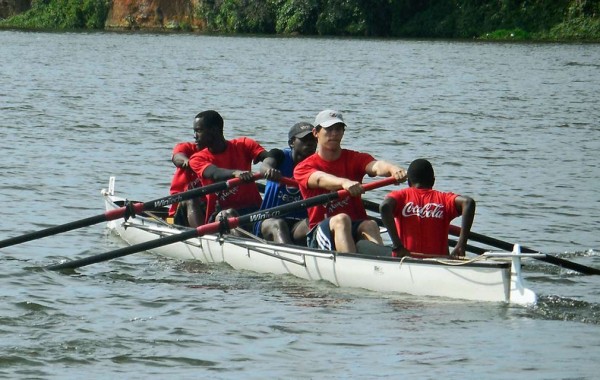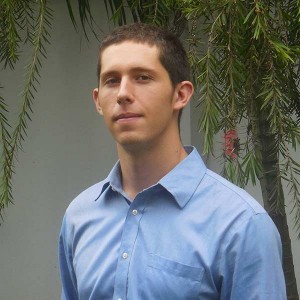
During his semester in Africa studying development economics, Matt Knowles ’15
competed with the Uganda Rowing Federation in the East African Rowing Championships.
Personal essay by Matt Knowles ’15
The engine roared and the car lurched forward, hurtling us into the morass of mud that used to be the right side of the road. Our wheels quickly lost traction and consequently all of the momentum we had built up before reaching the hill. “Ehhh,” sighed Ben, my driver. The rainy day had turned the rural Ugandan road into a slip-and-slide. Ben called over some boys on the side of the road who had been helping other vehicles that were also stuck. They asked for 20,000 shillings (about $8) for their assistance, which I was more than willing to pay to get home before nightfall after a long day of collecting data. They got behind the car and started shoving and yelling, rocking the car back and forth. Ben gunned the engine, mud spraying everywhere. The smell of burning rubber wafted upward. Exasperated, I gazed outside into the dark. Night had come and we weren’t budging.
Nabaya, my host-father, climbed out of the back of the car and assured me that we would make it through. Ben didn’t seem particularly worried either, jovially chatting with the boys trying to help us. It seemed like I was the only one who believed we’d never get the car free. Just as I was giving up hope, Ben managed to get the car out, and in an hour we were safe and sound. Moments like this during my four months in Uganda showed me that Africa is not the “dark continent” it is made out to be. The darkness we find is often what we bring with us.
 I entered Colgate with a strong penchant for economics and a vague desire for some sort of international career. The spring of my first year, I took a course on comparative politics taught by Professor Illan Nam that introduced me to the study of development and how the conversation extended well past foreign aid. One particular book really sparked my academic interest: States and Power in Africa — written, coincidentally, by our very own president, Jeffrey Herbst. His analysis of the confluence of historical, political, and economic factors that led to state formation in Africa taught me to think in completely new ways.
I entered Colgate with a strong penchant for economics and a vague desire for some sort of international career. The spring of my first year, I took a course on comparative politics taught by Professor Illan Nam that introduced me to the study of development and how the conversation extended well past foreign aid. One particular book really sparked my academic interest: States and Power in Africa — written, coincidentally, by our very own president, Jeffrey Herbst. His analysis of the confluence of historical, political, and economic factors that led to state formation in Africa taught me to think in completely new ways.
Over the subsequent years, I have come to believe that the vast inequality of wealth and poverty is the greatest tragedy of the modern age. Learning that I could have the power to do something about it motivated me to pursue a career in development economics. I took every course related to the field I could find. Before I knew it, I was a junior studying with the School for International Training (SIT) to study development for the semester and work as an intern at a think tank in Tanzania the following summer.
Part of my time with SIT included an independent study project of my own design. I chose to research coffee cooperatives in the rural Bugisu region of Eastern Uganda. My objective was to analyze whether or not cooperative membership was associated with higher incomes and better coffee prices for farming households. In order to do this, I spent five weeks in the field administering surveys and collecting data, working only with Ben, a young man who also served as my translator. We spent close to nine hours working and driving together every single day and soon became close friends. The project was a massive undertaking and, as I would soon discover, too ambitious for an undergraduate with very little experience in developing countries and none in the field. Innumerable unanticipated difficulties began to pile up and my data collection slowed to a crawl. Even before our car got stuck in the mud (twice, actually) we dealt with unreliable mobile phone networks, cultural disconnects, language barriers, car troubles, possibly inaccurate data (because none of the farmers keep records of their incomes), and claylike laterite soil roads that would turn into impassable, slick mud whenever it rained (which it did every day).
I cursed my ignorance of the challenges I would find on the ground, and all that I could think about was going home.
As the weeks passed, I was quickly getting nowhere and I became incredibly discouraged and miserable. I cursed my ignorance of the challenges I would find on the ground, and all that I could think about was going home. It was around this time that Nabaya took me to his family’s village on top of the foothills surrounding neighboring Mt. Elgon. The trip turned out to be exactly what I needed to pull me out of my funk. After a harrowing journey up ridiculously steep slopes, we had lunch in his childhood home. He told me stories of when he was a little boy during the time of Idi Amin. He had to carry tens of kilograms of coffee on his head over the mountains to sell in Kenya across the border. It would take days of walking on dangerous footpaths barefoot and in all sorts of weather — when he was only 10 years old! And yet, he speaks about it like it was nothing.
That conversation set the tone for the rest of my time in the field. I paid less attention to my own difficulties and more to the way in which villagers around me faced everyday hardships. A muddy road might be discouraging, but it never stopped the locals from carrying their produce to market, wearing no shoes, but smiling widely. Even though they had to deal with drought, disease, poverty, or worse on a daily basis, they pushed through their work undeterred. I remember one of the farmers I interviewed in particular. The woman, a single mother of four, successfully ran the entire farm, property, and family on her own after her husband died five years ago. I wondered how people like her were able to persist through such difficult obstacles every day and came to suspect that it had to do with expectations.
Instead of blaming those around me, I tried to do my best to take things in stride.
Inspired by this notion, I decided to take a much more laid-back approach to these challenges. It was simply the nature of the beast that unexpected problems would pop up. Instead of blaming those around me, I tried to do my best to take things in stride.
The fact is, I had brought the darkness to Africa myself. I was far too quick to blame the farmers, the environment, and the Ugandan culture for my difficulties. The real culprit of my frustration was how my unrealistic expectations negatively affected my reactions. I now understand that development projects go awry when workers don’t respond to the conditions on the ground. At least in my case, things did not go quite that badly. I managed to obtain 94 out of my original goal of 100 surveys — enough to be able to analyze the data in the hopes of future publication. But, beyond the results, I have learned that an intimate knowledge of the local culture and environment are the most important things in development work. It seems that sometimes the worst experiences make for the best lessons.






